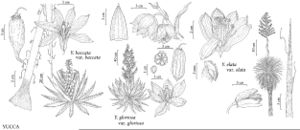Difference between revisions of "Yucca elata var. elata"
FNA>Volume Importer |
FNA>Volume Importer |
||
| Line 7: | Line 7: | ||
|name=Yucca angustifolia var. elata | |name=Yucca angustifolia var. elata | ||
|authority=Engelmann | |authority=Engelmann | ||
| − | }}{{Treatment/ID/Synonym | + | }} {{Treatment/ID/Synonym |
|name=Yucca angustifolia var. radiosa | |name=Yucca angustifolia var. radiosa | ||
|authority=unknown | |authority=unknown | ||
| − | }}{{Treatment/ID/Synonym | + | }} {{Treatment/ID/Synonym |
|name=Yucca radiosa | |name=Yucca radiosa | ||
|authority=unknown | |authority=unknown | ||
| Line 28: | Line 28: | ||
|elevation=400–1900 m | |elevation=400–1900 m | ||
|distribution=Ariz.;N.Mex.;Tex.;n Mexico (Chihuahua;Coahuila;Sonora). | |distribution=Ariz.;N.Mex.;Tex.;n Mexico (Chihuahua;Coahuila;Sonora). | ||
| − | |discussion=<p>Yucca elata var. elata is quite variable according to both S. D. McKelvey (1938–1947) and J. M. Webber (1953). The plants are arborescent with peduncles and inflorescences shorter than to as long as the stems, and are found from west Texas through southern New Mexico and southeastern and central Arizona. Hybrids between Y. elata and Y. glauca, Y. constricta, and Y. baileyi are thought to occur in areas of sympatry (J. M. Webber 1953).</p> | + | |discussion=<p><i>Yucca elata </i>var.<i> elata</i> is quite variable according to both S. D. McKelvey (1938–1947) and J. M. Webber (1953). The plants are arborescent with peduncles and inflorescences shorter than to as long as the stems, and are found from west Texas through southern New Mexico and southeastern and central Arizona. Hybrids between <i>Y. elata</i> and <i>Y. glauca</i>, <i>Y. constricta</i>, and <i>Y. baileyi</i> are thought to occur in areas of sympatry (J. M. Webber 1953).</p> |
|tables= | |tables= | ||
|references= | |references= | ||
| Line 52: | Line 52: | ||
|publication year= | |publication year= | ||
|special status= | |special status= | ||
| − | |source xml=https://jpend@bitbucket.org/aafc-mbb/fna-data-curation.git/src/ | + | |source xml=https://jpend@bitbucket.org/aafc-mbb/fna-data-curation.git/src/8f726806613d60c220dc4493de13607dd3150896/coarse_grained_fna_xml/V26/V26_889.xml |
|genus=Yucca | |genus=Yucca | ||
|species=Yucca elata | |species=Yucca elata | ||
Revision as of 17:47, 18 September 2019
Plants caulescent, arborescent, 1.2–4.5 m. Stems 1–2.5 m. Leaf blade 30–95 × 0.4–1.3 cm. Inflorescences paniculate, 7–15 dm; branches 0.7–2.5 dm; peduncle 1–2 m. Flowers: tepals 4.5–5.7 × 1.3–3.2 cm; filaments 2–2.5(–3.2) cm; anthers 3.2–4.8 mm; pistil 2.8–3.2 cm. Capsules 5–8.2 × 2.5–4 cm. 2n = 30.
Phenology: Flowering spring–early summer.
Habitat: Desert hillsides, grasslands
Elevation: 400–1900 m
Distribution

Ariz., N.Mex., Tex., n Mexico (Chihuahua, Coahuila, Sonora).
Discussion
Yucca elata var. elata is quite variable according to both S. D. McKelvey (1938–1947) and J. M. Webber (1953). The plants are arborescent with peduncles and inflorescences shorter than to as long as the stems, and are found from west Texas through southern New Mexico and southeastern and central Arizona. Hybrids between Y. elata and Y. glauca, Y. constricta, and Y. baileyi are thought to occur in areas of sympatry (J. M. Webber 1953).
Selected References
None.
